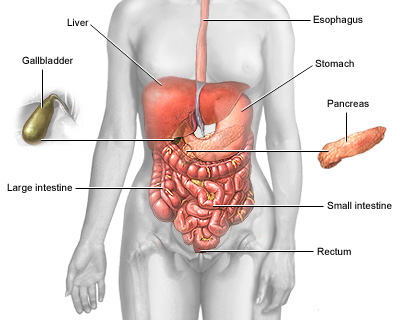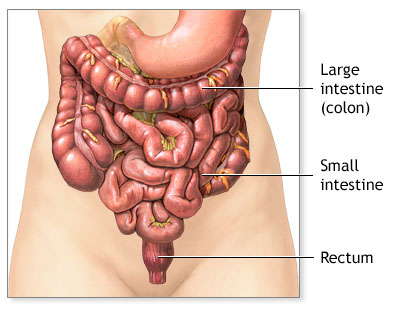Bacterial gastroenteritis
Bacterial gastroenteritis is inflammation of the stomach and intestines caused by bacteria.

Causes
Bacterial gastroenteritis can affect one person or a group of people who all ate the same food. It more commonly occurs after eating at picnics, school cafeterias, large social functions, or restaurants.
The germs may get into your food (called contamination) in different ways:
- Meat or poultry may come into contact with bacteria from the intestines of an animal being processed
- Water that is used during growing or shipping may contain animal or human waste
- Improper food handling or preparation in grocery stores, restaurants, or homes
Food poisoning often occurs from eating or drinking:
- Any food prepared by someone who did not wash their hands properly
- Any food prepared using unclean cooking utensils, cutting boards, or other tools
- Dairy products or food containing mayonnaise (such as coleslaw or potato salad) that have been out of the refrigerator too long
- Frozen or refrigerated foods that are not stored at the proper temperature or are not reheated properly
- Raw fruits or vegetables that have not been washed well
- Raw vegetable or fruit juices and dairy products (look for the word "pasteurized" to make sure the food is safe to eat or drink)
- Undercooked meats or eggs
- Water from a well or stream, or city or town water that has not been treated
Many different types of bacteria can cause bacterial gastroenteritis, including:
- Campylobacter jejuni (Campylobacter enteritis)
- E. coli (E. coli enteritis)
- Salmonella (Salmonella enteritis)
- Shigella (Shigella enteritis)
- Staphylococcus
- Yersinia
Symptoms
Symptoms depend on the type of bacteria that caused the sickness. All types of food poisoning cause diarrhea. Other symptoms include:
- Abdominal cramps
- Abdominal pain
- Bloody stools
- Loss of appetite
- Nausea and vomiting

Figure: Your small intestine is the longest part of your digestive system - about twenty feet long! It connects your stomach to your large intestine (or colon) and folds many times to fit inside your abdomen. Your small intestine does most of the digesting of the foods you eat. It has three areas called the duodenum, the ileum, and the jejunum.
Exams and Tests
Your health care provider will examine you for signs of food poisoning, such as pain in the stomach and signs your body does not have as much water and fluids as it should. This is called dehydration.
Laboratory tests may be done on the food or a stool sample to determine what germ is causing your symptoms. However, these tests do not always show the cause of the diarrhea.
Tests may also be done to look for white blood cells in the stool, a sign of infection.
Treatment
You will usually recover from the most common types of bacterial gastroenteritis in a couple of days. The goal is to make you feel better and avoid dehydration.
Drinking enough fluids and learning what to eat will help keep you or your child comfortable. You may need to:
- Manage the diarrhea
- Control nausea and vomiting
- Get plenty of rest
If you have diarrhea and are unable to drink or keep down fluids because of nausea or vomiting, you may need fluids through a vein (IV). This is especially true for young children.
If you take diuretics ("water pills"), talk to your health care provider. You may need to stop taking the diuretic while you have diarrhea. Never stop or change medications without first talking to your health care provider.
Antibiotics are usually not prescribed for most common types of bacterial gastroenteritis, unless the diarrhea is very severe.
You can buy medicines at the drugstore that can help stop or slow diarrhea.
- Do not use these medicines without talking to your health care provider if you have bloody diarrhea, a fever, or the diarrhea is severe.
- Do not give these medicines to children.
Outlook (Prognosis)
You should be better in a few days without treatment.
Certain rare types of E. coli can cause severe anemia or even kidney failure.
When to Contact a Medical Professional
Call for an appointment with your health care provider if you have:
- Blood or pus in your stools, or your stool is black
- Diarrhea with a fever above 38°C
- Recently traveled to a foreign country and developed diarrhea
- Stomach pain that does not go away after a bowel movement
- Symptoms of dehydration (thirst, dizziness, light-headedness)
Also call your doctor if:
- The diarrhea gets worse or does not get better in 2 days for an infant or child, or 5 days for adults
- A child over 3 months old has been vomiting for more than 12 hours; in younger babies, call as soon as vomiting or diarrhea begins
Alternative Names
Infectious diarrhea - bacterial gastroenteritis; Acute gastroenteritis; Gastroenteritis – bacterial
Source: http://www.nlm.nih.gov/medlineplus/ency/article/000254.htm

